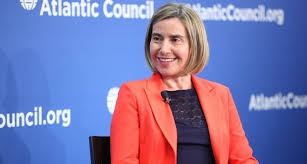Brève
Lors d'une discussion au Conseil atlantique de Washington, la Haute représentante de l’UE a fait savoir, le répétant par trois fois, que l’Amérique est priée de ne pas s’interférer dans les affaires européennes. Une mise au point salutaire, certes. A condition d’en faire une règle générale (et non pas une simple revendication par dépit, au cas par cas).
Interrogée sur ce qu’elle attend de la part de la nouvelle administration, Federica Mogherini s’est exprimée sans détours : « Pas d’ingérence. Pas d’ingérence. Nous n’interférons pas dans les politiques intérieures des États-Unis, ce n'est pas à moi ou à aucun autre Européen de commenter les choix ou les décisions de politique intérieure des États-Unis. Il en va de même pour l'Europe. Pas d’ingérence. »[1]

Crédit photo: Atlantic Council
Son interlocuteur, le président du Conseil atlantique, légèrement surpris, trouvait cette approche plutôt « minimaliste ». Sur quoi Mme Mogherini a répondu en parlant de rumeurs, de voix et de signes qui indiquent tous que « certains » appellent au démantèlement de la construction européenne. Pour mémoire, dans son récent entretien au Times/Bild, D. Trump avait lui-même précisé qu’il ne se souciait « pas vraiment de savoir si elle [l’UE] va se séparer ou rester unie, pour moi, ça n’a pas d’importance », et que « d’autres pays suivront » l’exemple du Brexit, qu’il avait par ailleurs applaudi.[2]
A croire qu’il a touché, là, un point sensible. Car ce n’est certainement pas la première fois qu’un président américain s’immisce ouvertement dans les affaires internes de l’UE, et ce n’est pas non plus la première fois que l’on lui oppose publiquement une fin de non-recevoir. Sauf que jusqu’ici, c’est la France qui s’en est chargée à chaque fois. Comme, en son temps, le président Chirac. Irrité d’entendre son homologue américain, George W. Bush, déclarer devant une audience turque que « vous devriez obtenir une date de l’UE pour votre entrée dans l’Union européenne », sa réponse fut cinglante. Pour le chef de l’Etat, le président américain « est non seulement allé trop loin, mais il est allé sur un terrain qui n'est pas le sien. Il n'avait aucune vocation à donner une obligation ou une voie quelconque à l'Union européenne. C'est comme si j'expliquais aux Etats-Unis la façon dont ils doivent gérer leurs relations avec le Mexique ».[3]
Dans le même esprit, le président Hollande n’a pas beaucoup apprécié les déclarations de B. Obama au sujet des futures négociations du Brexit. En marge du sommet de l’OTAN à Varsovie, en juillet 2016, il ironise : « moi, je trouve toujours amical que Barack Obama nous dise ce qu’il faut faire pour l’Europe. De la même manière, sur le même plan amical, je peux aussi conseiller aux Américains de faire le bon choix le moment venu ».[4] Son conseil n’ayant manifestement pas été écouté, et suite au fameux entretien du nouveau président élu, F. Hollande le répète : « L’Europe n’a pas besoin de conseils extérieurs pour lui dire ce qu’elle a à faire ».[5]
Pour une fois, sous « l’effet Trump », d’autres aussi commencent à sortir du bois, et la Haute représentante en personne lui emboîte le pas. Federica Mogherini récuse toute tentative d’ingérence de la part des Etats-Unis et affirme que « nous sommes des adultes, nous sommes responsables pour nous-mêmes ». Sauf que, à en juger par le spectacle des dirigeants européens qui vivent au rythme des volte-face quasi quotidiens de la Maison Blanche et sont accrochés à chaque demi-phrase sortie de la bouche des nouveaux responsables US – « l’interférence » américaine en Europe a encore de beaux jours devant elle.
***
[1] A conversation with Federica Mogherini, Atlantic Council, Washington D.C., 10 février 2017. A partir de 37:20 minutes.
[2] Full transcript of interview with Donald Trump, The Times, 16 janvier 2017. Voir aussi: Donald Trump se lâche sur l’Europe, Le Temps, 16 janvier 2017.
[3] Conférence de presse de Jacques Chirac, à l’occasion du sommet de l’OTAN, Istanbul, 28 juin 2004.
[4] Conférence de presse de François Hollande, lors du Sommet de l'OTAN, Varsovie, 9 juillet 2016.
[5] Propos du président Hollande à l’occasion de la décoration de Jane Hartley, ambassadrice des Etats-Unis, 16 janvier 2017.
Tags:
relations transatlantiques




















